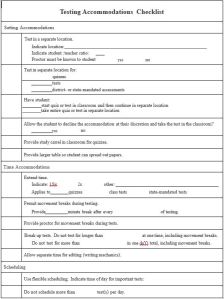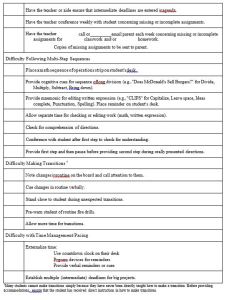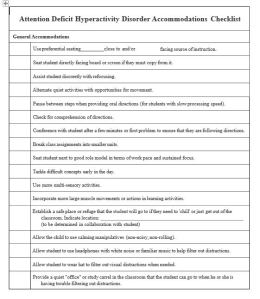Use this checklist to determine which school accommodations would be best for your child. You can download and print the Word document here:Homework Accommodations Checklist
ils@npc
www.ilsatnpc.com
Author Archives: npclinic
Testing Accommodations Checklist
Use this checklist to determine which school accommodations would be best for your child. You can download and print the Word document here: Testing Accommodations Checklist
Executive Dysfunction Accommodations Checklist
Use this checklist to determine which school accommodations would be best for your child. You can download and print the Word document here: Executive Dysfunction Accommodation Checklist
AD/HD Accommodations Checklist
Use this checklist to determine which school accommodations would be best for your child. You can download and print the Word document here: ADHD Accommodations Checklist
ADHD by the Numbers: Facts, Statistics, and You
Check out this article from http://www.healthline.com that outlines the statistics regarding AD/HD.
http://www.healthline.com/health/adhd/facts-statistics-infographic#1

How to Talk to Your Child About ADHD Medication
 About ADHD
About ADHD
Have you ever been so bored that you didn’t know what to do with yourself? Maybe your parents wanted you to sit and watch an old movie where everyone is always breaking into song. Sitting there, you might have felt fidgety and squirmy and wanted to bounce off the walls.
Imagine having that feeling a lot. That’s what it can feel like to have attention deficit hyperactivity disorder (ADHD).
Feeling this way a lot of the time can make it difficult for someone to get work done at school or follow instructions given by a parent. Kids who have ADHD might yell out the answers to questions before other kids in class have a chance to raise their hands. They also can be disorganized, distracted, and forgetful. They might lose things and have trouble finishing assignments. They may move around a lot, talk nonstop, or interrupt other people’s conversations.
Most kids do some of these things some of the time, but when a kid is acting this way a lot of the time, it’s a good idea to talk to a doctor, psychiatrist, psychologist, or therapist. One of these people can figure out if the kid has ADHD.
With help, kids with ADHD can learn to act differently. Sometimes medicine can help a kid take control of his or her behavior, but only a doctor can decide if ADHD medicine is needed.
Medicine and the Mind
There are a lot of different types of ADHD medicines. They don’t cure ADHD, but do help kids have better control of their behaviors. They help a kid with ADHD focus better, pay attention, not be as distracted, and be less hyperactive. If a kid stops taking ADHD medicine, the symptoms can come back.
ADHD medicines affect chemicals in the brain called neurotransmitters (say: nur-OH-tranz-mit-urz). Neurotransmitters help send messages between nerve cells in the brain. Some of the medicines for ADHD are called stimulants, but instead of stimulating the person and making him or her more jittery, they help control ADHD symptoms. Stimulant medicines work right away, and kids taking them may notice an improvement very quickly.
Other ADHD drugs are called non-stimulants. Non-stimulants can take up to a few weeks to start working. The kid’s doctor and parents will decide which is the best medicine for the kid based on the kid’s symptoms.
The medicine comes in pills or capsules, liquid, and even a patch. The doctor will explain how often the kid needs to take the medicine. Parents and kids will have to work out a schedule for taking it so it becomes part of the normal routine, like teeth brushing.
It might take a while to find the right medicine and the right amount (the dose) that works best for a kid. While this is getting worked out, it can be frustrating for the kid and parents who want things to get better. Once the right medication is found, things often start to improve for someone with ADHD.
And just like with any medicine, the kid’s parents and doctors will want to watch for side effects, which are other problems or symptoms that may be caused by the medicine. Not all kids have side effects. But those who do might have a decreased appetite, stomachache, headache, trouble sleeping, or irritability (feeling grouchy).
How Therapy Can Help
Along with medicine, behavior therapy can help kids with ADHD. This means learning a different way of doing things and learning ways to stay calm and keep focused.
To do this, a kid and his or her parents might see a mental health professional (psychiatrist, psychologist, therapist, social worker, or counselor). As part of behavior therapy, teachers and parents might create charts or other systems for rewarding the kid for meeting goals that have been set.
At school, kids with ADHD might need to work on staying seated or finishing class work. At home, the goals might be remembering to put dirty clothes in the hamper and keeping track of important things, like shoes and backpacks.
Once a kid can meet these goals, he or she will probably feel happier, which is the best medicine of all!
Taken from http://kidshealth.org/kid/feel_better/things/ritalin.html
Reviewed by: Shirin Hasan, MD
Date reviewed: July 2014
ADHD – Kid-Friendly Explanation
 When someone says a kid is hyperactive, it can be a sign that the kid might have ADHD. ADHDstands for a condition called attention deficit hyperactivity disorder.
When someone says a kid is hyperactive, it can be a sign that the kid might have ADHD. ADHDstands for a condition called attention deficit hyperactivity disorder.
Kids with ADHD have problems paying attention and sitting still in their seats, and they can be impulsive,which means doing things without thinking about the results. This can cause problems like getting hurt. Some kids who have ADHD can have difficulty in school. Some might have trouble making friends.
ADHD is something a kid is born with. It is not something like the flu that you can catch from someone. A kid has a greater chance of being born with ADHD if he or she has a relative who has ADHD.
What Are the Signs of ADHD?
ADHD can cause kids to act in different ways, depending on the kid who has it. Most kids with ADHD have problems concentrating and paying attention. Some also might have trouble sitting still in class and waiting for their turn. They might yell out the answers before other kids have a chance to raise their hands.
Sometimes they can be disorganized, distracted, or forgetful. They tend to daydream in class. They might lose things and have trouble finishing assignments. They may wiggle around in their seats, move around a lot, talk too much, or interrupt other people’s conversations.
It’s important to remember that everybody does these things once in a while. If you do them sometimes, it doesn’t mean you have ADHD. Kids with ADHD have these problems most or all of the time. This can cause them to have problems both at home and at school.
Kids with ADHD can become worried, frustrated, angry, and sad. Kids need to know that ADHD is a medical problem that can be treated.
If the Doctor Says It’s ADHD
When parents and teachers suspect that a kid has ADHD, the first step is to visit the doctor. The doctor might then refer the kid to a specialist like a psychologist, psychiatrist, or behavioral pediatrician. They are experts who know about kids who have ADHD and other kinds of behavior problems. Part of the doctor’s job is to check for other illnesses that look like ADHD but need different kinds of treatment.
If the doctor determines that a kid has ADHD, then the doctor and parents can begin to work together to find the best way to help. For many kids, this means taking medicine to help them have better control of their behaviors and going to therapy (counseling).
ADHD Medicines
There are a lot of different ADHD medicines. The medicine will not cure the ADHD, but it will will help control the symptoms of ADHD, and that helps a kid do better. Medicine can help kids pay attention, focus better, and be less hyper.
Most kids only take the medicine before school, but some may need to go to the nurse in the middle of the school day to take medicine. The medicine comes as a liquid, pill, capsule, and even a patch. Your doctor and your parents will decide which medicine is best for you.
What Therapists Do
Kids who have ADHD need more than just medicine. They need help learning how to change the way they act. Some also may need help with dealing with their feelings of anger, sadness, and worry.
A therapist (or counselor) can help. Therapists work with kids and their parents to come up with a plan. They will give them ideas about how to make changes at home that will be helpful for the kid with ADHD. If needed, they can help kids learn to build better friendships.
A therapist or counselor may recommend relaxation and behavior therapy. In relaxation therapy, counselors teach kids how to relax and stay calm by doing deep-breathing exercises and relaxing different muscle groups. Behavioral therapy teaches kids and parents to set goals and uses rewards to help kids reach those goals.
Teachers also can reward kids who have ADHD when they show good control, such as being able to sit still during class. Parents can offer rewards at home for paying attention, completing chores, or keeping track of things.
If a kid has ADHD, his or her parents may want to let the principal and teachers know. Why? Because then the kid can get extra help with schoolwork, if needed. The school may set up a plan so things go more smoothly at school, such as giving the kid a quieter place to take a test or extra time to complete work.
Kids who have ADHD can have normal, happy lives. The key to success is having a plan and a team. Who’s on the team? The kid, parents, teachers, therapist, and doctor, who are all working together for the same goal.
Taken from http://kidshealth.org/kid/health_problems/learning_problem/adhdkid.html
Reviewed by: Shirin Hasan, MD
Date reviewed: September 2014
Being Afraid – Kid Friendly Explanations
Kid Friendly Explanations for Just About Everything!
 We here at iLs@nPc love http://www.kidshealth.org! It is packed full of kid-friendly explanations for many different medical conditions, feelings, life problems, and even grown-up illnesses. I have already printed off several of them to give to some of the older kids here who want to know more about self-esteem, worry, hyperactivity, and being afraid.
We here at iLs@nPc love http://www.kidshealth.org! It is packed full of kid-friendly explanations for many different medical conditions, feelings, life problems, and even grown-up illnesses. I have already printed off several of them to give to some of the older kids here who want to know more about self-esteem, worry, hyperactivity, and being afraid.
Click the Pic for more info!
Omega-3 Fats Improve Behavior in Children
Proper nutrition during early childhood is essential for proper brain function. Poor nutrition in early childhood is associated with increased aggressive behavior through adolescence by negatively impacting brain structure and function. Brain abnormalities have been found not just in adults with aggressive behavior problems but also in children with aggressive behavior. As a result, improved nutrition through adolescence is thought to possibly help with behavior problems.
Click the Pic to learn more!












